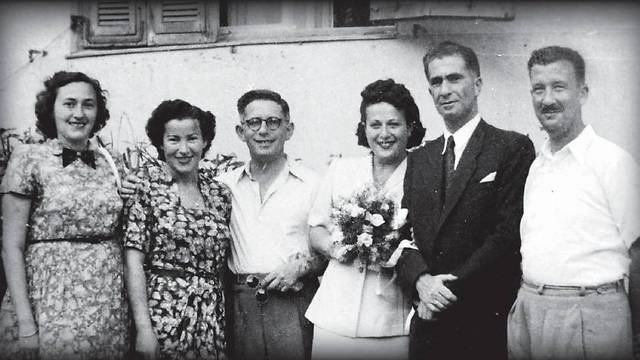Op-ed: There are few countries in the world in which a man can hold in his hand a thread that starts at the country’s first days, and converse with a lucid, living person who saw how everything began; so hurry up and find these people, as they are quick to disappear or forget.
One day, 72 years ago, a tall woman entered a Polish library on Allenby Street, managed by the friends Meller, Lipschitz and Sarna. The three of them were young Polish immigrants, good-natured and jesting, even during the World War, when letters from their family members stopped coming. They were always in a suit and tie.
The Giraffe, a forthright Sabra called Yaffa Raskin, who was 1.76 meters tall, was looking for a job. She was quickly hired to work at the library and promptly began collecting lost debts and unreturned books. In very short order, she fell in love with the blue-eyed Lipschitz and married him.
He was my father’s best friend, and his partner in a business that was only losing money. But it was a wonderful spot, filled with friends, the smell of paper and cigarette smoke, and served as an alternative family to the lonely pioneers who have yet to learn that they have been orphaned of everything.
Five couples, including my parents, came together during that time and after the war, and so they remained friends for the next 50 years. Lipschitz was a right-wing Beitar member and a customs broker, and Grynszpan was an electrician at the Brenner House, Dolly worked at the Zionist General Council, and Salek at the Shekem. My father, Israel, was a teacher.

Every Friday they met at a different house, with herring and cheap cognac, yelled a lot and argued, and had a lot of laughs with their wives: Luba and Hannah, Yaffa, Yona, and Yola, my mother, until they grew old and their meetings faded away along with their health, and they died one after the other.
This month, I started looking for Yaffa “the Giraffe,” as she was fondly nicknamed by all of the short men. She alone was still alive out of the five couples, I learned. I located her a week ago through her daughter, while she was recovering at a hospital, and soon after she was released, 93 years old with an oxygen tank and excellent memory, I came to her home in Tel Aviv and heard from her about the entire gang – about my parents, and about her parents, the Raskins, who were among the founders of Tel Aviv during the famous Seashell Lottery.
She was born in April 1922, exactly a year after her father, Moshe, a tanner who owed a leather shop in Ajami in Jaffa, miraculously survived the Jaffa Riots in May 1921 when his Arab landlord hid him from those who sought to kill him.
Yaffa was the youngest daughter and grew up in Tel Aviv’s first convenience store, which was opened on Lilienblum Street after the rioting.
This week, three days after I interrogated her over the past, Yaffa lifted her head in his home on Be’eri Street and asked her caretaker Clara: “Shall I die?” and this is how she passed away.
There are few countries in the world in which a man can hold in his hand a thread that starts at the country’s first days, and converse with a lucid, living person who saw how everything began. And any one of you who is curious about his family’s past, that of his parents and childhood, should talk to the people from then, soon. They are quick to disappear or forget, and there is no homeland except for that found in living memory.
As reported by Ynetnews
